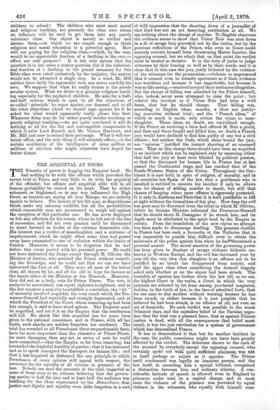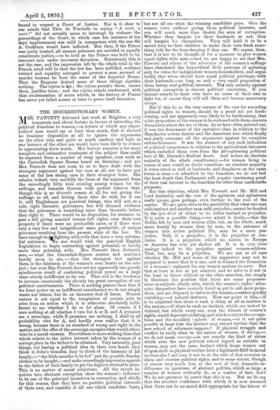THE ACQUITTAL AT TOURS. T HE Nemesis of power is dogging
the Emperor hard. He had nothing to do with the offence which provoked the recent trial at Tours, and very little to do with the acquittal of the offender, but offence and acquittal alike will in all human probability be visited on his head. That he either suborned, or frightened, or in any way influenced the High Court, as fanatics are saying all over Europe, we are entirely unable to believe. The history of his life may, as Republicans think, make any calumny credible, but all the probabilities which reasonable men are accustomed to weigh tell against the reception of this particular one. He has never displayed or felt any affection for his cousin, whom he left out of the line of succession, and did not even pension until he threatened to stand forward as leader of the extreme democratic side. His interest was a verdict of manslaughter, and a sentence of imprisonment, which he might when some time had passed away have commuted to one of seclusion within the limits of Corsica. Moreover, it seems to be forgotten that he had before this event parted with his personal power. He could not have instructed the Judge except through M. 011ivier, the Minister of Justice, who arrested the Prince without consult- ing the Sovereign, and he could not that we can see have instructed the Jury at all. They were all men of the better class, all chosen by lot, and all too old to hope for favours at the hands either of the Ministry or the Monarch. Moreover, they did not, as a body, vote for Prince Pierre. The vote, it seems to be ascertained, was equal, eighteen to eighteen, and as the law requires a majority to establish a conviction, the "tie " of necessity involved acquittal, the very result which the Pro- cureur-General had especially and strongly deprecated, and at which the President of the Court, whose summing-up had been fair enough, is said to have stood aghast. The Emperor must be acquitted, and yet it is on the Empire that the retribution will fall. No shock like this acquittal has for -years been given to the national conscience, and in France, with all her faults, such shocks are neither forgotten nor condoned. The trial has revealed to all Frenchmen three unquestionable facts, facts far more important than the character of Prince Pierre, far more damaging than any act or series of acts he could have committed,—that the Empire, so far from removing, has intensified the frightful hostility of parties ; that it has increased and so to speak corrupted the disrespect for human life ; and that it has impaired or destroyed the one principle to which Frenchmen of every opinion still appeal with respect, the reverence for the equality of all citizens in presence of the law. Nobody can read the accounts of the trial, impartial as some of them seem to be, without believing that the govern- ing motive in half the jury and at least half the audience was loathing for the ideas represented by the Marseillaise, that justice and dignity and equality were alike forgotten in a sort of wild impression that the shooting down of a journalist of that kind was not an .act deserving retribution at all. We say nothing about the charge of murder. To English observers the evidence seems to show that Victor Noir was shot down in a fit of savage fury provoked not by the victim, but by the previous reflections of the Prince, who even in Court could scarcely restrain himself from threatening Maitre.Laurier, the opposing counsel, but we admit that on that point the verdict. must be treated as decisive. It is the duty of juries to judge witnesses by their bearing as well as by their words, and it is clear that in this case the jury, justly irritated by the violence of the witnesses for the prosecation,—violence so ungoverned that it seemed even to friendly spectators as if their evidence- was worthless not because it was improbable, but because it was so like raving,—resolved to reject their testimonyaltogether- But the charge of killing was admitted by the Prince himself,. who, indeed., never even attemped to raise the point ; but related the incident as if Victor Noir had been a wild beast, shot lest he should charge. That killing was, according to English ideas, murder, a blow not justify- ing execution without trial ; and the " French ideas," or which so much is made, only reduce the crime to man- slaughter. Those ideas, no doubt, are uncivilized enough.. If the Prince on receiving a blow had offered M. Noir a pistol, and then and there fought and killed him, no doubt a 'French. jury would have declined to find him guilty of any but a civil offence ; but neither the Code, which alone bound the jury, nor " opinion " justified the instant shooting of an unarmed man. That on this charge there should have been an acquittal is an incident which can be explained only by assuming either- that half the jury at least were blinded by political passion, or that the disrespect for human life in France has at last- passed the Continental stage, and has reached that of the- South-Western States of the Union. Throughout the Con- tinent it is now held, in spite of religion, of morality, and in all countries bat Spain of the law, that a gentleman who is. insulted is entitled to execute his insulter if only he allows him his chance of adding murder to insult, but still that chance of heaping crime upon offence is rigorously protected.. Itis only in Alabama and Paris that it is held justifiable to kill at sight without the formalities of fair play. How deep the evil has gone may be discerned from the letter in which M. 011ivier, before he became Minister, informed the Proeureur-Generat that he should shoot M. Cassagnac if he struck him, and its. depth must be attributed to the spirit bred by the Empire in society. From the foundation of the new regime no attempt. has been made to discourage duelling. The greatest duellist in France has been such a favourite at the Tuileries that it was impossible to punish him, difficult even' to obtain the- assistance of the police against him when he hadOthreatened a personal assault. The moral sanction of the governing power- has been given to displays of savage violence hitherto un- known in Western Europe, and the evil has increased year by year till the very idea that slaughter is an offence not to be- justified by an insult has disappeared from society, and half the upper class when considering the Auteuil tragedy asked only whether or no the slayer had been struck. The- brutality of opinion has broken down the law till, as we see,_ the highest Court in the realm, a Court in which the very- jurymen are selected by lot from among provincial magnates, decides, in the teeth of law, in the face of admitted facts, that for one man to slay another without warning because he has: been struck, or rather because it is just possible that he believed he had been struck, is no offence at all, not even an act of homicide. No such verdict was possible in the worst Orleanist days, and the mistaken belief of the Parisian popu- lace that the trial was a planned farce, that as against Princes. justice is dead, with all the consequences that belief must. entail, is but the just retribution for a system of government which has demoralized France.
It has so demoralized it that but for another incident in, the case, the public conscience might not have been greatly affected by the verdict. The deference shown to the rank of the accused by everybody except the opposing counsel, who- certainly spoke out with quite sufficient plainness, was not in itself perhaps so unjust as it appears. The Prince• until condemned was legally an innocent person, and the law itself, in according him a special tribunal, recognized a distinction between him and ordinary citizens. A con- siderable latitude of speech is allowed even in England to prisoners under trial on a capital charge, and in most• cases the violence of the prisoner was provoked by equal violence in the witnesses, who equally with himself were bound to respect a Court of Justice. Nor is it clear to our minds that Ulric de Fonvielle in crying " A mort, a snort I" did not actually mean to interrupt by violence the proceedings of the Court, in which case his sentence of ten days' imprisonment was mild in comparison with the one Sir A. Cockburn would have inflicted. But then, if the Prince was justly treated, all meaner prisoners are entitled to equally considerate justice,—to be held as the Prince was held to be, innocent men under necessary detention. Notoriously this is not the case, and the impression left by the whole trial in the French mind will be that the law has been nullified, evidence twisted and equality outraged to protect a man accused of murder because he bore the name of the Imperial House. That the Emperor desired none of these things signifies nothing. The regime is kis ; the regime permits them, causes them, justifies them ; and the regime stands condemned, with that condemnation of scorn which, in the history of France has never yet failed sooner or later to prove itself executive.



































 Previous page
Previous page